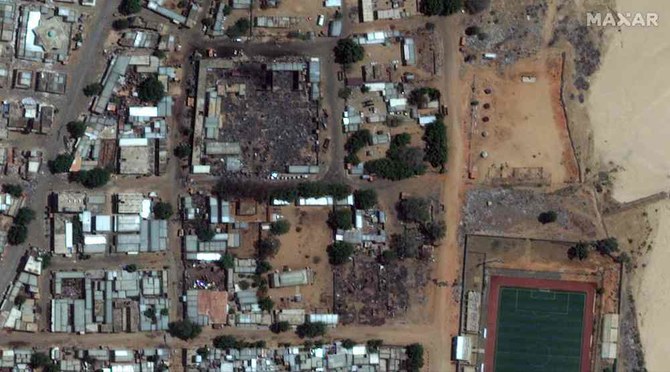
- ARAB NEWS
- 14 Jul 2025

JUBA, South Sudan: Plagued by continuing conflict despite the calls for a ceasefire, Sudan finds itself grappling with a new and controversial weapon on its battlefield: drones. These unmanned aerial vehicles have sparked intense debate among experts, who question whether they hold the power to reshape the ongoing war.
The drones possess the capability to drop substantial mortar rounds, marking a concerning development in the country’s ongoing conflict that has entered its third month. This is not the first instance of such weaponized drones appearing in the region, as similar sightings were reported in Yemen and later in Ethiopia.
Also, in the Sahel region, armed drones have significantly impacted the dynamics of the conflict. These aerial platforms have proven effective in Mali, Burkina Faso, and Niger in targeting high-value individuals and disrupting insurgent operations. The enhanced situational awareness provided by drones has allowed security forces to launch pre-emptive strikes and thwart potential attacks, reducing the risk to civilian populations.
Sudan’s small but formidable drone fleet, comprising Chinese, Iranian-made, and indigenous UAVs, provides Sudan with enhanced surveillance capabilities and precision strikes.
الجنجويد يستخدموا هذا النوع من المسيرات الاماراتية ضد #الجيش_السوداني pic.twitter.com/JGTHrxp52b
— يوميات المارشال (@DMarshalSd) June 13, 2023
The appearance of the drones in multiple conflict zones indicates a concerning trend of non-state actors harnessing advanced drone technology to gain a military advantage. The consequences of such technology falling into the wrong hands can have far-reaching implications for regional stability and the safety of civilian populations.
Eyewitnesses in Khartoum have reported the presence of drones in the city’s skies, particularly in the southern Khartoum region where the army’s tank unit is based. These drones, suspected to belong to the Rapid Support Forces, have been launching attacks on the tanks, resulting in retaliatory fire.
Experts say that this represents a significant shift in the tactics employed in Sudan’s conflict as they offer a new level of aerial firepower, allowing them to carry out targeted strikes with precision.
Fidel Amakye Owusu, a security analyst and peace researcher, contends that “the allure of drones lies in their convenience and lower risks compared to manned aircraft.”
However, he warns that this convenience may inadvertently perpetuate the conflict. Each drone strike, while potentially advantageous to the warring party, “results in casualties that heighten the complexity of the conflict, making it increasingly difficult to achieve a peaceful resolution,” he says.
Similarly, Gordon K’achola, an international relations expert, cautions against employing drones in internal conflicts like Sudan’s. “Within a state you don’t know who you are going to hit next. Therefore, it could be very difficult in such a scenario for drones to turn the tides.”
الجيش بحوم فوق في الجو لقطات جديدة من مسيرات الجيش السوداني ترصد ميلشيا… https://t.co/iMplY5uG1h via @YouTube
— البعشوم (@B3shom) May 30, 2023
He argues that drones have the potential to escalate the situation, leading factions to become more deeply entrenched in the war.
“Unlike in state-versus-state conflicts such as Nagorno-Karabakh in the south Caucasus, where drones have proven effective, the dynamics change when these aerial weapons are deployed within a country embroiled in internal strife,” K’achola says, pointing out that in such scenarios, the lack of clear front lines and the challenge of distinguishing friend from foe raise uncertainties about the impact of drone usage.
K’achola also highlights the grave human rights implications of drone strikes, emphasizing their inability to distinguish between combatants and non-combatants. “Innocent civilians, including children and the elderly, are likely to fall victim to these attacks further complicating an already dire situation in Sudan,” he added.
The conflict in Sudan showcases the evolving nature of warfare, with drones playing an increasingly prominent role in military strategies worldwide. Their utilization can level the playing field in conflicts where one side possesses air superiority while minimizing risks to human pilots. However, the rapid proliferation of drones necessitates international cooperation and coordinated efforts to ensure responsible use and prevent misuse of this technology.